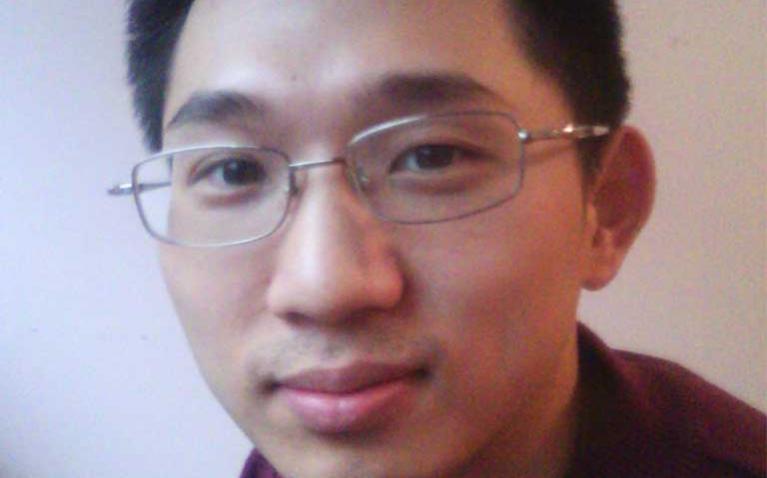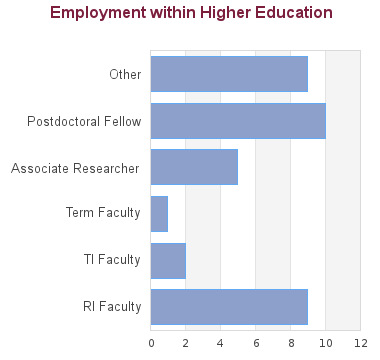
Xin Ye
Job Title
Research Scientist
Employer
Arbutus Biopharma Inc.

Review details about the recently announced changes to study and work permits that apply to master’s and doctoral degree students. Read more
The UBC Department of Pathology and Laboratory Medicine offers a remarkable opportunity to study with numerous world renowned faculty and research programs. We are recognized as national and international leaders in both basic and clinical research. Experimental Pathology refers to research in any area of biomedical investigation that is relevant to human disease. Since it is necessary to understand the normal working of the system to fully define the changes associated with disease, the areas represented at UBC cover a wide range of fields and approaches. Work at all levels of biological organization is involved, from protein to lipoprotein biochemistry and molecular biology through cell and tumour biology, animal models for studies on pulmonary and cardiovascular pathophysiology and viral and bacterial infection processes, to clinical studies on human population and the AIDS epidemic.
We train students with varied backgrounds in science and medicine including: biochemistry, physiology, cell biology and microbiology/immunology.
We are committed to effective, cutting-edge, ethical research. The results of which will reach beyond the academic realm to effect positive change in the lives of our families, communities and, ultimately, our world.
The Faculty of Graduate and Postdoctoral Studies establishes the minimum admission requirements common to all applicants, usually a minimum overall average in the B+ range (76% at UBC). The graduate program that you are applying to may have additional requirements. Please review the specific requirements for applicants with credentials from institutions in:
Each program may set higher academic minimum requirements. Please review the program website carefully to understand the program requirements. Meeting the minimum requirements does not guarantee admission as it is a competitive process.
Applicants from a university outside Canada in which English is not the primary language of instruction must provide results of an English language proficiency examination as part of their application. Tests must have been taken within the last 24 months at the time of submission of your application.
Minimum requirements for the two most common English language proficiency tests to apply to this program are listed below:
Overall score requirement: 100
Reading
22
Writing
21
Speaking
21
Listening
22
Overall score requirement: 7.0
Reading
6.5
Writing
6.5
Speaking
6.5
Listening
6.5
Some programs require additional test scores such as the Graduate Record Examination (GRE) or the Graduate Management Test (GMAT). The requirements for this program are:
The GRE is required by some applicants. Please check the program website.
Deadline to submit online application. No changes can be made to the application after submission.
Transcript DeadlineDeadline to upload scans of official transcripts through the applicant portal in support of a submitted application. Information for accessing the applicant portal will be provided after submitting an online application for admission.
Referee DeadlineDeadline for the referees identified in the application for admission to submit references. See Letters of Reference for more information.
All applicants have to submit transcripts from all past post-secondary study. Document submission requirements depend on whether your institution of study is within Canada or outside of Canada.
A minimum of three references are required for application to graduate programs at UBC. References should be requested from individuals who are prepared to provide a report on your academic ability and qualifications.
Many programs require a statement of interest, sometimes called a "statement of intent", "description of research interests" or something similar.
Students in research-based programs usually require a faculty member to function as their thesis supervisor. Please follow the instructions provided by each program whether applicants should contact faculty members.
Permanent Residents of Canada must provide a clear photocopy of both sides of the Permanent Resident card.
All applicants must complete an online application form and pay the application fee to be considered for admission to UBC.
| Fees | Canadian Citizen / Permanent Resident / Refugee / Diplomat | International |
|---|---|---|
| Application Fee | $116.25 | $168.25 |
| Tuition * | ||
| Installments per year | 3 | 3 |
| Tuition per installment | $1,875.34 | $3,294.66 |
| Tuition per year (plus annual increase, usually 2%-5%) | $5,626.02 | $9,883.98 |
| Int. Tuition Award (ITA) per year (if eligible) | $3,200.00 (-) | |
| Other Fees and Costs | ||
| Student Fees (yearly) | $1,144.10 (approx.) | |
| Costs of living | Estimate your costs of living with our interactive tool in order to start developing a financial plan for your graduate studies. | |
Applicants to UBC have access to a variety of funding options, including merit-based (i.e. based on your academic performance) and need-based (i.e. based on your financial situation) opportunities.
All full-time students who begin a UBC-Vancouver PhD program in January 2023 or later will be provided with a funding package of at least $26,000 for each of the first five years of their PhD. The funding package may consist of any combination of internal or external awards, teaching-related work, research assistantships, and graduate academic assistantships. In addition, the Program provides tuition funding of $2,000.00 per year for each of the first five years of the PhD. Please note that some graduate programs provide funding packages that are greater than $26,000 total per year. Please check with your prospective graduate program for specific details of the funding provided to its PhD students.
This results in a net balance (any funding provided to the student minus tuition and fees) mean of $38,667 and median of $36,409.
All applicants are encouraged to review the awards listing to identify potential opportunities to fund their graduate education. The database lists merit-based scholarships and awards and allows for filtering by various criteria, such as domestic vs. international or degree level.
Many professors are able to provide Research Assistantships (GRA) from their research grants to support full-time graduate students studying under their supervision. The duties constitute part of the student's graduate degree requirements. A Graduate Research Assistantship is considered a form of fellowship for a period of graduate study and is therefore not covered by a collective agreement. Stipends vary widely, and are dependent on the field of study and the type of research grant from which the assistantship is being funded.
Graduate programs may have Teaching Assistantships available for registered full-time graduate students. Full teaching assistantships involve 12 hours work per week in preparation, lecturing, or laboratory instruction although many graduate programs offer partial TA appointments at less than 12 hours per week. Teaching assistantship rates are set by collective bargaining between the University and the Teaching Assistants' Union.
Academic Assistantships are employment opportunities to perform work that is relevant to the university or to an individual faculty member, but not to support the student’s graduate research and thesis. Wages are considered regular earnings and when paid monthly, include vacation pay.
Canadian and US applicants may qualify for governmental loans to finance their studies. Please review eligibility and types of loans.
All students may be able to access private sector or bank loans.
Many foreign governments provide support to their citizens in pursuing education abroad. International applicants should check the various governmental resources in their home country, such as the Department of Education, for available scholarships.
The possibility to pursue work to supplement income may depend on the demands the program has on students. It should be carefully weighed if work leads to prolonged program durations or whether work placements can be meaningfully embedded into a program.
International students enrolled as full-time students with a valid study permit can work on campus for unlimited hours and work off-campus for no more than 24 hours a week during academic sessions.
A good starting point to explore student jobs is the UBC Work Learn program or a Co-Op placement.
Students with taxable income in Canada may be able to claim federal or provincial tax credits.
Canadian residents with RRSP accounts may be able to use the Lifelong Learning Plan (LLP) which allows students to withdraw amounts from their registered retirement savings plan (RRSPs) to finance full-time training or education for themselves or their partner.
Please review Filing taxes in Canada on the student services website for more information.
Applicants have access to the cost estimator to develop a financial plan that takes into account various income sources and expenses.
85 students graduated between 2005 and 2013: 1 graduate is seeking employment; for 8 we have no data (based on research conducted between Feb-May 2016). For the remaining 76 graduates:


An Experimental Pathology degree opens up a world of opportunities. Because of the multidisciplinary nature of our program, graduates are working on research all over the world that is personalized to their interests. Our alumni have gone on to become national and international opinion leaders, valued staff researchers and administrators in academia or the biotechnology industry, studied clinical medicine or dived into the venture capital and equities domain.
These statistics show data for the Doctor of Philosophy in Pathology and Laboratory Medicine (PhD). Data are separated for each degree program combination. You may view data for other degree options in the respective program profile.
| 2023 | 2022 | 2021 | 2020 | 2019 | |
|---|---|---|---|---|---|
| Applications | 6 | 9 | 9 | 2 | 5 |
| Offers | 1 | 2 | 2 | 1 | 2 |
| New Enrolment | 1 | 2 | 2 | 1 | 2 |
| Total Enrolment | 34 | 34 | 33 | 33 | 35 |
Students in research-based programs usually require a faculty member to function as their thesis supervisor. Please follow the instructions provided by each program whether applicants should contact faculty members.
These videos contain some general advice from faculty across UBC on finding and reaching out to a supervisor. They are not program specific.
| Year | Citation |
|---|---|
| 2013 | Dr. Schrader investigated the association between germline mutations in CDH1 and familial lobular breast cancer. She showed the utility of new sequencing technologies to identify disease susceptibility genes. Her work has implications for identification of novel cancer susceptibility genes which will benefit people at high-risk for familial cancers. |
| 2013 | Dr. Wiegand studied the genetic origins of ovarian cancers linked to endometriosis. Her work revealed a new tumour suppressor gene in ovarian cancer, which has substantially improved the understanding of this disease. Her work could lead to improvements in the management of ovarian and other cancer types. |
| 2013 | Dr. Hendel's research focussed on the role of Granzyme B in athero-sclerosis, the primary cause of heart attacks and strokes. Dr. Hendel's work uncovered a novel mechanism by which Granzyme B disrupts new blood vessel formation during tissue repair. The results of his work are now published and also resulted in the filing of an international patent. |
| 2013 | Dr. Hollander designed novel methods for discovering biomarkers for heart health. Using these methods, she discovered biomarker panels that can predict and diagnose acute cardiac allograft rejection and diagnose recovered heart function. Her work may improve heart transplant and heart failure patient management. |
| 2013 | Dr. Hiebert studied age-related skin disorders. He showed that Granzyme B, an enzyme produced during chronic inflammation, contributes to skin aging and to the persistence of chronic wounds that do not heal. These findings help to explain age-related skin disorders like chronic wound healing, and may contribute to improved treatment. |
| 2013 | Dr. Potter investigated the reasons that transplants of insulin-producing cells fail. She revealed that those transplants undergo changes similar to those in type 2 diabetes, including the formation of toxic protein plaques. Her findings may contribute to new therapies to improve the function of insulin-producing cells in transplants and in type 2 diabetes. |
| 2012 | Dr. Boivin studied Granzyme B, an enzyme that breaks apart proteins, to determine its role in blood vessel and skin diseases. She identified proteins outside of cells, specifically broken down by Granzyme B, that contribute to those diseases. Dr. Boivin's work resulted in several articles being published in scientific journals, as well as patents licensed to a local biotechnology company. |
| 2012 | Dr. Lin identified and examined molecules in the blood of heart transplant patients. Those molecules can help indicate when patients are having acute and chronic immune rejection episodes. His work demonstrated the potential use of these molecules, known as biomarkers, in a clinical setting, as well as their value in helping us understand the biology behind transplant heart rejection. |
| 2012 | Dr. Heine conducted research into stem cells and the way blood vessels regenerate. She implanted a device, similar to a petri dish, which allows the study of cells within the living body. Her work revealed that there are subtle and complex relationships between cells under different conditions. The findings will contribute to advancements in stem cell research. |
| 2012 | Dr. Krentz's research on drinking water safety showed that some bacteria can act as early warning indicators of a system failure, and others can be used to trace contamination back to a particular source. These findings will contribute to the development of better water protection measures for small water systems. |
Experimental Pathology refers to research in any area of biomedical investigation that is relevant to human disease. Since it is necessary to understand the normal working of the system to fully define the changes associated with disease, the areas represented at UBC cover a wide range of fields and approaches. Work at all levels of biological organization is involved, from protein to lipoprotein biochemistry and molecular biology through cell and tumour biology, animal models for studies on pulmonary and cardiovascular pathophysiology and viral and bacterial infection processes, to clinical studies on human population and the AIDS epidemic.
Departments/Programs may update graduate degree program details through the Faculty & Staff portal. To update contact details for application inquiries, please use this form.

Take a break from studying with opportunities at your fingertips. Whether you want to settle down in a café or take your research outdoors, we have a place for you.